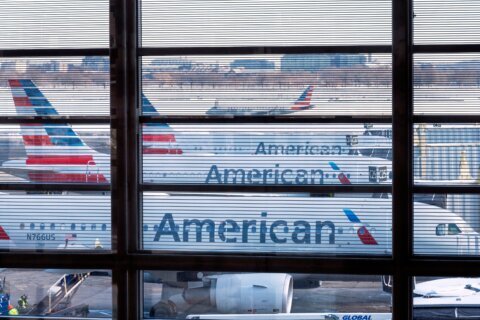BALTIMORE (AP) — More than 150 Catholic priests and others associated with the Archdiocese of Baltimore sexually abused over 600 children over the past 80 years, according to a state report released Wednesday that accused church officials of decades of cover-ups.
The report paints a damning picture of the archdiocese, which is the oldest Roman Catholic diocese in the country and spans much of Maryland. Some parishes, schools and congregations had more than one abuser at the same time — including St. Mark Parish in Catonsville, which had 11 abusers living and working there between 1964 and 2004.
The Maryland Attorney General’s Office issued the report during Holy Week — considered the most sacred time of year in Christianity ahead of Easter Sunday — and said the number of victims is likely far higher.
“The staggering pervasiveness of the abuse itself underscores the culpability of the Church hierarchy,” the report said. “The sheer number of abusers and victims, the depravity of the abusers’ conduct, and the frequency with which known abusers were given the opportunity to continue preying upon children are astonishing.”
The disclosure of the redacted findings marks a significant development in an ongoing legal battle over their release and adds to growing evidence from parishes across the country as numerous similar revelations have rocked the Catholic Church in recent years.
Baltimore Archbishop William Lori, in a statement posted online, apologized to the victims and said the report “details a reprehensible time in the history of this Archdiocese, a time that will not be covered up, ignored or forgotten.”
“The detailed accounts of abuse are shocking and soul searing. It is difficult for most to imagine that such evil acts could have actually occurred,” Lori said. “For victim-survivors everywhere, they know the hard truth: These evil acts did occur.”
David Lorenz leads the Maryland chapter of Survivors of those Abused by Priests and said Wednesday’s release of the report is a “great day” and indicates that the Catholic church no longer has the legislature “in their pocket.”
“The church used to hold sway in the legal system to such an extent that they could just make a call and a priest could get off. And I don’t think that’s the norm anymore,” Lorenz said.
Also on Wednesday, the state legislature passed a bill to end a statute of limitations on abuse-related civil lawsuits, sending it to the governor. The Baltimore archdiocese says it has paid more than $13.2 million for care and compensation for 301 abuse victims since the 1980s, including $6.8 million toward 105 voluntary settlements.
Maryland Attorney General Anthony Brown, who took office in January, said the investigation shows “pervasive, pernicious and persistent abuse.” State investigators began their work in 2019 and reviewed over 100,000 pages of documents dating back to the 1940s and interviewed hundreds of victims and witnesses.
Lorenz said it was overwhelming to see the number of pages detailing the number of abusive priests.
Only one person has been indicted as a result of the investigation’s findings: Neil Adleberg, 74, who was arrested last year and charged with rape and other counts. The case remains ongoing. Officials said he coached wrestling at a Catholic high school in the ’70s, then returned to the role for the 2014-2015 school year. The alleged abuse occurred in 2013 and 2014 but the victim was not a student of the school, officials said.
Other investigations involving the Archdiocese of Washington and the Diocese of Wilmington, Delaware, which both include parts of Maryland, are ongoing.
The Baltimore report largely focuses on the years before 2002, when an investigation by the Boston Globe into abuse and coverup in the Archdiocese of Boston led to an explosion of revelations nationwide. The nation’s Catholic bishops, for the first time, then agreed on reforms including a lifetime ban from ministry for any priest who commits even a single incident of abuse.
The report notes that while new national policies significantly improved the internal handling of reported abuse in the Baltimore archdiocese after 2002, significant flaws remained.
For example, some alleged abusers were allowed to retire, with financial support, rather than be ousted. In other cases, the archdiocese did not report allegations to authorities or would not remove abusers from the ministry or restrict their access to children.
In some situations, victims ended up reporting abuse to priests who were abusive themselves, prosecutors wrote.
Jean Hargadon Wehner said she was abused in Baltimore as a teen by a priest who served as her Catholic high school’s counselor and chaplain. She said she reported her abuse to church officials in the early ’90s, when her memories of the trauma finally surfaced about two decades after she was repeatedly raped.
“I expected them to do the right thing in 1992,” she told reporters Wednesday after the findings were released. “I’m still angry.”
The Associated Press typically doesn’t name victims of abuse, but Hargadon Wehner has spoken publicly to draw attention to the issue.
Lorenz said that for survivors, there’s a “sense of relief” that an institution now believes them.
“We have never had an institution believe or trust or engage in us in a positive manner. It’s always been a betrayal by institutions — the Catholic church, the legislature, the justice system,” Lorenz said.
Lawyers for the state asked a court for permission to release the nearly 500-page document and Baltimore Circuit Court Judge Robert Taylor ruled last month that a redacted version should be made public. The court ordered the removal the names and titles of 37 people accused of wrongdoing — whose names came out during confidential grand jury proceedings — but will consider releasing a more complete version in the future.
Lawmakers’ passage of a bill to end the state’s statute of limitations Wednesday came after similar proposals failed in recent years. Gov. Wes Moore has said he supports it. Currently, victims of child sex abuse in Maryland can’t sue after they turn 38. The bill would eliminate the age limit and allow for retroactive lawsuits.
The Archdiocese of Baltimore has long faced scrutiny over its handling of abuse allegations.
In 2002, Cardinal William Keeler, who served as Baltimore archbishop for nearly two decades, released a list of 57 priests accused of sexual abuse, earning himself a reputation for transparency at a time when the nationwide scope of wrongdoing remained largely unexposed. That changed, however, when Keeler was named in a sweeping Pennsylvania grand jury report that accused him of covering up sexual abuse allegations while serving as bishop of Harrisburg in the 1980s.
___
Witte reported from Annapolis and Brumfield reported from Silver Spring.
WTOP’s Mike Murillo contributed to this report.
Copyright © 2026 The Associated Press. All rights reserved. This material may not be published, broadcast, written or redistributed.







